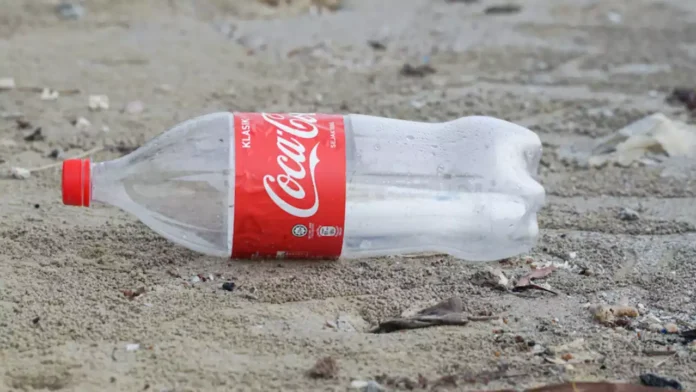A recent study published this week in the peer-reviewed journal Science Advances pinpointed some of the major brands responsible for plastic pollution across six continents.
The researchers, employing a team of over 100,000 volunteers, documented over 1.8 million pieces of plastic waste. Within the study, 28,570 brand names were identified on plastic debris collected from various locations, spanning beaches, rivers, and parks across 84 countries.
They discovered that the leading five companies accounted for 24% of the branded plastic, while a total of 56 companies were accountable for more than 50% of the branded plastic.
As per the research, thirteen companies have contributed at least 1% of the total branded plastic seen in the audit events. Each of the 13 businesses manufactures tobacco, beverage, or food products. The Coca-Cola Company, the world’s largest corporation, was accountable for 11%, which was significantly higher than any other company.
Continue Exploring: Food and Beverage industry shifts away from plastic packaging: Tetra Pak study reveals growing commitment to sustainability
Following Coca-Cola in the top ten plastic polluters were other F&B giants such as PepsiCo, Nestlé, Danone, Bakhresa Group, Unilever, Wings, Mayora Indah, Mondelēz, Mars, and Salim Group. PepsiCo accounted for 5% of the identified plastic goods, while Nestlé and Danone each contributed 3% with their products.
The report emphasized, “It’s crucial to acknowledge that the contributions of the top companies could be underestimated due to unattributed brands and numerous unbranded items.” This statement was made in light of the fact that over 50% of the plastic waste discovered was unbranded.
Food and beverage products “tend to have a shorter duration of use before disposal, including a higher percent of single-use items,” according to the researchers.
The report additionally pointed out that “food and beverage products are more likely to be consumed on-the-go” compared to household and retail products, which are “more commonly consumed within buildings, reducing the likelihood of escaping materials management infrastructure and leaking into the environment.”
The researchers indicated that the findings imply a need for a “paradigm shift” in how companies report their plastic production. They emphasized that whether voluntarily or mandated by governments or international agreements, such reporting can effectively address the issue. They urged producer brand managers and policymakers to prioritize solutions aimed at reducing plastic production.
The study reached the conclusion that to tackle global plastic pollution effectively, corporate producers of plastic waste should take several key actions. These include phasing out nonessential and avoidable single-use products, adopting safe and sustainable product designs to reduce global demand for new items while enhancing reusability, repairability, and recyclability. Additionally, investing in non-plastic alternatives with superior safety and environmental profiles is essential. Lastly, supporting alternative distribution models, like refill-reuse systems, can significantly reduce pollution.
Nestlé provided a statement saying, “Over the past five years, we have reduced our use of new (virgin) plastic by 14.9%. Since initiating our voluntary commitments to tackle plastic waste five years ago, we have notably surpassed the industry average in reducing virgin plastic usage and enhancing recyclability, as per the latest report from the Ellen Macarthur Foundation.”
Continue Exploring: Amcor and Mondelēz International collaborate to introduce recycled plastic packaging for Cadbury Chocolate products
The statement continued, “We are in Ottawa this week for the UN Treaty discussions and we support a globally enforceable legal regulation on plastic waste. Nestlé has over 220 initiatives aimed at creating efficient garbage collection, sorting, and recycling programmes throughout North America, South America, Asia, Europe, and Africa. Our efforts to maintain packaging materials out of the environment and within the circular economy will not stop.
A representative from Coca-Cola’s UK division conveyed, “We prioritize minimizing the environmental impact of every beverage we offer, actively striving to decrease our reliance on plastic packaging. Our ambitious objective is to retrieve and recycle a bottle or can for each one sold by 2030. Furthermore, we endorse well-structured ‘Deposit Return Schemes’ throughout Europe, recognizing their potential to facilitate the return of our packaging.”
Danone also issued a statement, expressing, “Packaging plays a crucial role in delivering convenient, high-quality food and beverages to people worldwide while maintaining the integrity and safety of the contents. Across the entire Danone family of companies, we are firmly committed to initiatives aimed at curbing plastic waste by advancing recycling and reuse efforts. We remain dedicated to reducing our own plastic footprint, achieving an 8% reduction in plastic usage between 2018 and 2023, amounting to 62,000 tons, and enhancing the recyclability of our packaging (currently at 84% recyclable, reusable, or compostable).”
Danone echoed the sentiments expressed by both the researchers and Nestlé, underscoring the necessity of collaborative action. The dairy company stated, “While we persist in supporting and advocating for enhanced collection and recycling systems to facilitate consumer recycling, it’s imperative to address systemic obstacles hindering plastic waste reduction. These challenges include the underdevelopment of reuse, collection, and recycling infrastructures, as well as the limited availability of recycled materials. Therefore, Danone has been a staunch advocate for an ambitious and binding UN Global Plastic Treaty, which presents a significant opportunity to catalyze and expedite progress toward circularity in plastics.”
Continue Exploring: Kellanova steps up sustainability efforts with major reduction in plastic packaging





